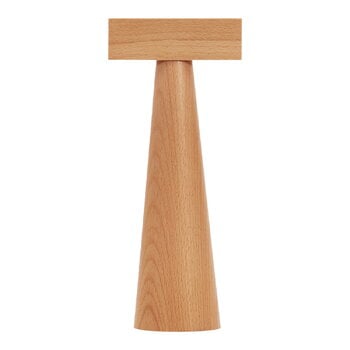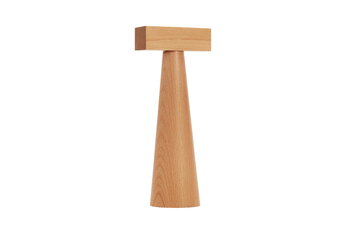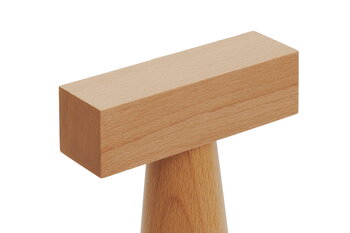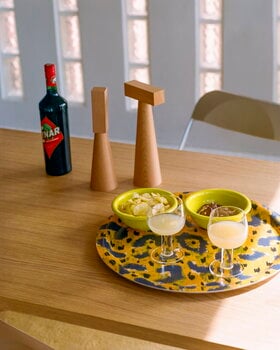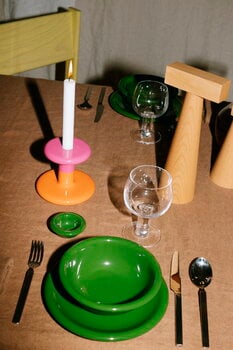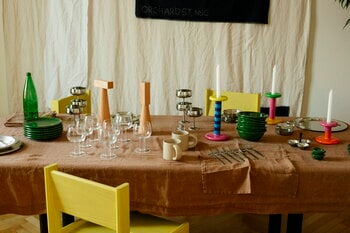Hem's Molino grinder blurs the line between everyday objects and sculptural decoration: the spice grinder happens to be both. Grinder's playful design and geometric shapes were inspired by the energy and vitality of designer Fabien Cappello's homeland, Mexico. Made from beech, the Molino spice grinder brings life and joy to any table setting – this spice grinder is so much fun to use that food might be in danger of becoming too spicy!
Molino grinder, horizontal, beech natural
Hem
Description
Hem's Molino grinder blurs the line between everyday objects and sculptural decoration: the spice grinder happens to be both. Grinder's playful design and geometric shapes were inspired by the energy and vitality of designer Fabien Cappello's homeland, Mexico. Made from beech, the Molino spice grinder brings life and joy to any table setting – this spice grinder is so much fun to use that food might be in danger of becoming too spicy!
Product details (7)
- Material
- Beech
- Colour
- Natural beech
- Width
- 13 cm
- Height
- 29 cm
- Diameter
- 9 cm
- Weight
- 0.6 kg
- Care instructions
- Wipe with a damp cloth.
- Product ID
Designer
French Fabien Cappello (s. 1984) is a furniture and product designer that has been shaking things up with his unique blend of creativity, technical know-how and an excellent eye for detail. He has studied at the University of Art and Design (ECAL) in Lausanne, Switzerland and at the Royal College of Art of London, where he graduated in 2009. The next year he founded his eponymous studio. Since 2016, Fabien has lived and worked in Mexico City.
View all productsReviews (0)
Sustainability
The Product Sustainability Framework, our criteria of sustainable design, helps you find the most sustainable products in our selection. Read below which sustainability criteria this product has met.
Working conditions & labour 8/9
-
Equal opportunities for all employees
-
Commitment to UN Global Compact, fair compensation for all employees
-
Corporate responsibility requirements defined and communicated for suppliers
-
Systematic work for improved inclusion and well-being in the workplace
-
Transparent supply chain
-
Suppliers' compliance to a code of conduct ensured
-
Compliance to the UN Guiding Principles on Business and Human Rights ensured in the supply chain
-
Support for community involvement in the supply chain
-
Direct suppliers audited and certified
Eco-friendly production 8/9
-
Fair and resource-wise water-use in production
-
No incineration or landfilling of returned items
-
No use of endangered species as materials
-
No direct environmental emissions or waste (excl. GHGs) from production
-
The sustainability of direct suppliers' production is addressed and monitored
-
Production and material sourcing that respect biodiversity, animal rights, and natural ecosystems
-
Material-efficient and ecological packaging
-
No potentially harmful chemicals used in own production
-
Positive impact on nature’s well-being through operations that regenerate natural ecosystems
Climate impact 4/8
-
Company's direct greenhouse gas emissions identified and commitment to reduction
-
Product's carbon impact identified and commitment to reduction
-
Guidance on energy- and eco-efficient use of the product
-
100 % renewable energy in own production and operations
-
Contribution to climate initiatives beyond the brand’s direct operations
-
Low-carbon or compensated transportation
-
Carbon footprint of the product calculated and goals set to reduce it
-
Carbon neutral or carbon negative product
Sustainable materials 6/6
-
Sustainable and long-lasting material choices
-
No harmful or hazardous substances
-
Responsible raw material sourcing and production
-
Materials suited for circularity: monomaterials, recyclable finishings, renewable or recycled contents etc.
-
Ecological materials: natural, biodegradable, recyclable or recycled contents
-
Outstanding materials in terms of innovativeness, responsibility, sustainability and circularity: local production or sourcing, 100 % recycled content, C2C-certification etc.
Circular design 4/5
-
High aesthetic quality promoting long-term use of the product
-
Technically durable product design and material choices
-
Design for enduring life-long quality
-
Design and support for product maintenance, repair and upgradability
-
Innovative circular design solutions: circular service system, resale platform, remanufacturing, collection of used products, etc.

